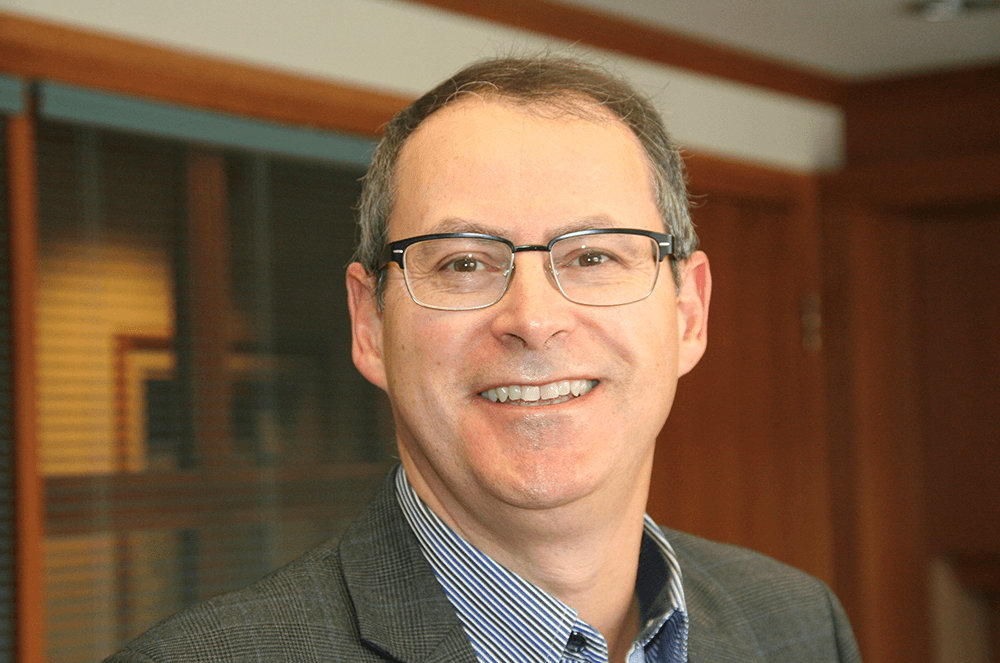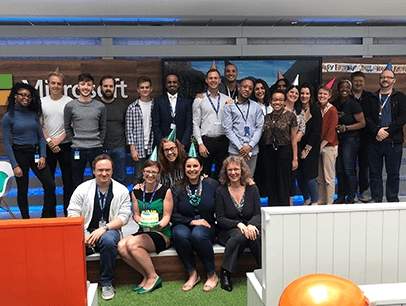In 2010, Toastmaster Tom Tryon collaborated with other Molson Coors Beverage Co. employees to charter Toast on Tap in Milwaukee, Wisconsin. From the start, the global company sponsored the club, paying member fees and providing club meeting space.
At one point, club membership dipped below 10 people. That’s when the club enlisted the help of two coaches, Shelly Runte, DTM, from Southwest Toastmasters in Greendale, Wisconsin, and Stephan Church, DTM, then a member of NM Speaks! also in Milwaukee. With their guidance, the club grew.
Runte encouraged members to promote the club across additional company channels. The news spread—piquing the interest of more employees, including the Molson Coors learning and development staff.
Leveraging Toastmasters
Today, Molson Coors doesn’t just sponsor Toast on Tap—it also integrates the Toastmasters program into the company’s learning and development efforts. Molson Coors’ TAP2LEAD initiative focuses on growing the company’s diverse talent. The six-month program includes Toastmasters, mentoring, and a capstone project.
Toastmasters training is also a part of the company’s eight-month LEAD program to foster the development of prospective vice presidents. LEAD offers a customized development track that includes an emphasis on public speaking.
Tryon is now an innovation project manager at Molson Coors and still a member of Toast on Tap. He’s seen the club grow to more than 50 people.
“The degree to which a company can perform well involves hiring, developing, and retaining the right people,” says Tryon. “Toast on Tap is integral to the company’s curriculum. It’s not just a check-the-box training, but something with real depth and richness to it.”
Lindsey Wondolkowski worked at Molson Coors and was already a Toast on Tap member when she interviewed for the position of people development specialist–leadership. The company was already integrating Toastmasters into TAP2LEAD, and the hiring manager wanted to find someone with Toastmasters experience for the job. With her skills, expertise, and Toastmasters background, Wondolkowski was hired.
“Developing yourself and learning new skills positions you in a really great place when a job opens up or helps set you up for a promotion,” says Wondolkowski.
Structuring a Corporate Club
Toast on Tap is just one of some 6,400 employer-based Toastmasters clubs worldwide. Corporate clubs can be organized in several ways. Many are composed of company employees and are sponsored, meaning the company provides some type of support, such as paying membership fees. The club may be for employees only, or open to non-employees too. Corporate clubs can also be a group of like-minded employees who come together on their own, without formal support from the employer.
Corporate clubs are not just for for-profit employers; clubs can also be hosted at nonprofit, governmental, and non-governmental organizations. Regardless, Toastmasters offers skill development and training in areas applicable to any kind of employer.
Fostering Employee Development
When members of a U.S.-based club sponsored by the global biotech Roche relocated to the company’s headquarters in Basel, Switzerland, they chartered a corporate club there. It took a year of semi-monthly informal meetings to prove to leadership the group was serious and sustainable.
“Roche recognized the positive impact the informal meeting practice was having on employees’ performance and confidence during this first year of informal meetings. They offered meeting facilities and funding once the club chartered,” says Thorsten Enderlin, Roche learning and development director and RoBa ToMaS - Roche Basel Toastmasters’ Vice President Public Relations.
“High-performing organizations operate as empowered networks coordinated through culture … our club is enabling employees to operate in that network and embody the company’s values.”
—Iulia DraganThe club hosts company leaders as guests, while club members are often requested speakers at department-level events. This club is one of at least nine other Roche-based clubs worldwide. Expansion is planned in other company locations, including the possibility of a German-speaking club in Basel. The company holds its own public speaking World Cup to foster connection among its groups.
“High-performing organizations operate as empowered networks coordinated through culture,” says Iulia Dragan, Roche scrum master, coach, and RoBa ToMaS - Roche Basel Toastmasters’ President. “Our club is enabling employees to operate in that network and embody the company’s values.”
“Fulfilled employees—employees who take leadership of their career and development—are how we measure success at Roche from a learning and development point of view,” adds Enderlin.
Power Speakers Club, a club sponsored by BC Hydro, a regional Canadian energy corporation, is based in Burnaby, British Columbia, and open to full-time employees and internal consultants.
BC Hydro provides financial support to Power Speakers through its capital infrastructure and development group, rather than the human resources department. Members align their Toastmasters journeys with their BC Hydro personal development plans, and the Pathways curriculum counts toward industry continuing-education credits, as communications and leadership learning is one of four official competency areas for registered engineers and geoscientists in British Columbia.
“Through presenting at club meetings, our members can claim credit toward Engineering and GeoScientists of British Columbia professional development points under the presentation category,” says Mark Sherrington, BC Hydro environment project implementor–water program, and a Power Speakers member.
Roselia Moreno is an asset performance planning–project manager consultant for BC Hydro. A full-time employee and club member encouraged Moreno to attend a club meeting. When she finally visited, she joined right away.
Moreno pays her own club dues. That’s the only difference she notices between members who are full-time employees and internal consultants like herself. “The atmosphere of the club is very welcoming, and there are no differences whether you are an employee or a contractor,” she says.
Moreno recommends getting involved as much as possible to maximize the networking and learning. “You are able to network and meet other people from different business units that might open the opportunity for additional work or facilitate any project that might require support from them,” she notes.
She organized the first joint meeting among the three clubs BC Hydro sponsors. The clubs now meet jointly three times a year, with each one in charge of a meeting. This increases networking, provides a more challenging environment in which to learn, and allows clubs to share best practices with each other.
Boosting Organizational Benefits
Sponsored clubs aren’t just good for employees; they’re also beneficial for organizations. That’s been consistently true, especially now during a tough job market for employers. So, offering on-the-job professional development can be a competitive advantage.
Organizations pay a lot of money to hire and onboard new employees. It’s important for them to retain the talent they invest in. Toastmasters is a cost-effective approach for long-term professional development, with a high return on investment. It offers an important way for employers to connect and engage employees, helping them get to know each other outside of their work roles, and providing a supportive environment.
“Developing employees and showing you’ll pay for their Toastmasters membership to develop their leadership and communications skills speaks volumes,” says Wondolkowski, of the Molson Coors club. She says one of the reasons employees stay at Molson Coors is they see the development opportunities offered by and through the company.
Supporting Toastmasters Clubs
There are several ways organizations can sponsor clubs. Two of the most typical approaches include paying membership fees and providing meeting space or an online convening platform.
But many employers—like Molson Coors, Roche, and BC Hydro—go beyond that. Supervisors recommend employees join Toastmasters, and company leaders speak at club meetings. Toastmasters members are asked to participate in or lead internal events, and their participation in a club can count for internal or external professional development credits. Organizations may pay for club officers to attend District conferences or may partially sponsor those conferences. Some integrate the Toastmasters program into their learning and development offerings. Other companies even include club information and promote membership on their websites.
Sharing Lessons Learned
Employees hoping to start a corporate-based club should first consider demonstrating the value to the organization’s decision-makers.
“Start small,” says Maud Nale, DTM, District 74 corporate relations manager and member of Randburg Toastmasters in Johannesburg, South Africa, and L’Avenir Toastmasters, in Sandton, South Africa. “Starting a Toastmasters club at a company is largely based on trust. Once they [in management] see Toastmasters as credible, it will snowball, and greater things will come.”
It’s also important to consider connections beyond the human resources office. While this is a logical place to start, don’t limit yourself. Think about other departments that might be supportive of a Toastmasters club and reach out to colleagues there.
To maintain a successful corporate club, it’s important to remain visible to and in communication with your key sponsor contacts. Nale encourages club members to invite executives to the club, especially the ones who are supportive and those signing the checks. “Let them be keynote speakers,” she says. “Let them feel like they’re a part of it.”
For Toastmasters Districts with many corporate clubs—District 74, for example, has 90 such clubs across 12 countries—consider adding a corporate relations manager to the District officer team. Company-sponsored clubs have unique needs, says Nale. She has created special resources for the clubs, conducts specific officer training for them, and has held executive summits for club sponsors.
It’s also important to keep meetings productive and fun. Work environments can be intense, and people might be stressed. You want to offer colleagues something they can’t get in their daily routine.
“Can we offer enough bang for the buck for that person to say, Yeah, I’m going to free up that time. I’m going to make the time, because I need it,” says Tryon, with Toast on Tap.
Consider starting, joining, or supporting a sponsored Toastmasters club. There are so many benefits for members and organizations. The Toastmasters value proposition is stronger than ever.
Jennifer L Blanck, DTM has more than 25 years of career development and advising experience. She is a member of 5-Star Toastmasters Club in Arlington, Virginia, and AAMC Toastmasters in Washington, D.C., as well as a regular contributor to the Toastmaster magazine. Learn more at jenniferlblanck.com
Related Articles

Your Turn
A Corporate Club Reimagined

Club Experience
Toastmasters Works

Professional Development



 Previous
Previous

 The Mutual Benefits of Sponsored Clubs
The Mutual Benefits of Sponsored Clubs
 Previous Article
Previous Article